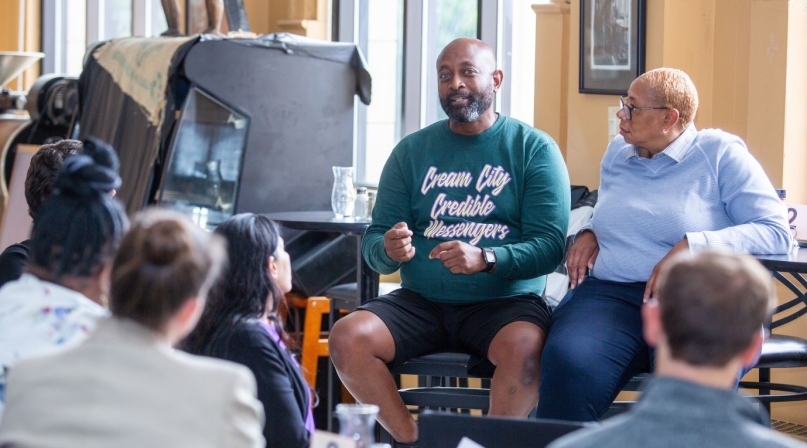Family response is key to treating opioid disorders
Author
Upcoming Events
Related News

Key Takeaways
Reducing barriers to opioid use disorder treatment can save lives.
With that in mind, Milwaukee County, Wis. is taking steps to make sure those resources are as close to the people who need them as possible, including strategic placing of harm-reduction vending machines in historically underinvested neighborhoods.
Community-driven efforts, facilitated by social service connection organizations like WestCare, highlight the importance of collaboration between service systems, youth engagement and environmental prevention.
Learn more
Those were just some of the ideas presented when NACo’s Opioid Solutions Leadership Network and Prenatal-to-Three County Leaders Academy met there in August.
The cohorts also toured key elements of Milwaukee County’s health and human services system, including the Penfield Children’s Center, where county leaders learned about the importance of early intervention services for young children.
At Coffee Makes You Black, Opioid Solutions Leadership Network members heard from key community partners in holistic and behavioral health service provision. The discussion focused on practical strategies to address the urgency of the overdose crisis, with a focus on eliminating hurdles that prevent people from accessing necessary resources. This included creating same-day access to services and implementing a “no wrong door” approach, where those with behavioral health needs can be linked to treatment and recovery services through interaction with any organization, including county entities throughout the criminal legal system.
Crucially, involving individuals with firsthand experience in substance use challenges was highlighted, as their insights are invaluable in understanding the complexities of their needs.
Additional emphasis was placed on family-centered care, recognizing that families are the cornerstone of communities. Representatives and “graduates” of the sober living homes run by Samad’s House spoke to the importance of having gender-specific care for women in recovery and in finding community.
“My fight is to save lives. My fight is to show women that they can recover, recover their lives and live holistically,” founder Tahira Malik told the cohort.
Through peer-learning discussions, county leaders determined that equitable treatment distribution requires active community engagement and breaking barriers and addressing access disparities.
By leveraging cross-cutting approaches, counties can ensure that no one is overlooked and that services can be designed to save lives, strengthen families and contribute to thriving communities.
The national convening promoted the need to strengthen cross-systems collaboration to promote positive outcomes for children and families, especially those experiencing systemic and structural barriers.
Featured Initiative
Opioid Solutions Center
NACo's Opioid Solutions Center empowers local leaders to invest resources in effective treatment, recovery, prevention and harm reduction practices that save lives and address the underlying causes of substance use disorder.

Related News

Drug tracking software helps counties identify trends, save lives
Florida counties are using an artificial intelligence tool called Drug TRAC to track and report drug trends, with the aim of providing quicker outreach and saving lives.

White House Executive Order establishes national substance use disorder response
On January 29, the White House issued an Executive Order (EO) establishing the Great American Recovery Initiative, a new federal effort aimed at coordinating a national response to substance use disorder (SUD).

USDA and HHS release new dietary guidelines
On January 7, U.S. Department of Agriculture Secretary Brooke Rollins and U.S. Department of Health and Human Services Secretary Robert F. Kennedy, Jr. unveiled the new Dietary Guidelines for Americans, 2025–2030.
